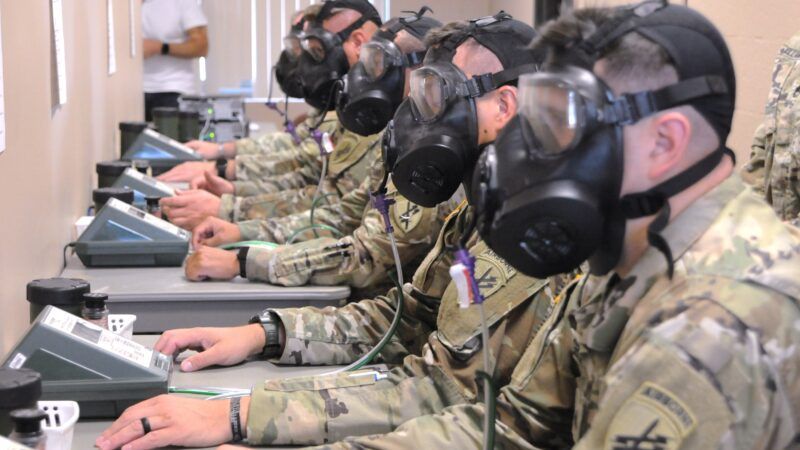The U.S. Military Is Helping Arab Dictatorships Run Psyops
The Pentagon spends a lot of taxpayer money on propaganda worldwide. Some of it is coordinated with Middle Eastern dictators, The Washington Post revealed.

The U.S. has done a lot for Arab dictators. For years, Democrats and Republicans have been seeking to give Saudi Arabia, the largest purchaser of American weapons in the world, a NATO-like defense pact. And Washington is drawing closer to Qatar, the Saudi kingdom's nearby frenemy. After pledging to defend Qatar last month, the Trump administration announced a new training facility for Qatari military pilots in Idaho last week.
One of the many favors that the U.S. has given to these governments is helping to drown out dissenting voices, documents given to The Washington Post by the International Consortium of Investigative Journalists reveal. Over the past three years, U.S. officials led meetings of Middle Eastern countries to plan "information operations," the documents show, and planned to create a "Combined Middle East Cyber Center" and an "Information Fusion Center" to systematize these efforts.
The documents were a series of PowerPoint presentations about the "Regional Security Construct," a secret U.S.-led coalition which includes Israel, Qatar, Bahrain, Egypt, Jordan, Saudi Arabia, and the United Arab Emirates. Kuwait and Oman were listed as "potential partners" whose officials were briefed about the coalition meetings.
The Post's coverage focuses on the hypocrisy of the Arab states; while they denounced Israel's war in Gaza, those states were actively working with the Israeli military, including on tunnel warfare training and air defense coordination. However, buried in the reporting is the revelation that those states are receiving direct American help in shaping their propaganda campaigns.
U.S. Central Command (CENTCOM) officials were leading meetings on "information operations to counter Iran's narrative that it is the regional protector of Palestinians and, according to a 2025 document, to 'propagate [a] partner narrative of regional prosperity and cooperation,'" the Post reports.
And those American officials were working to expand these operations further, advocating for creating an ominously-named "Information Fusion Center" to help coalition members "rapidly plan, execute, and assess operations in the information environment."
Arab states have put a lot of stock in the internet as a tool of domestic control. Many critics in the Regional Security Construct countries have been reportedly tortured—or even sentenced to death, in the case of Saudi Arabia—simply for posting on social media.
Despite knowing about the repression in Arab states, the U.S. government has been happy to teach them more effective online surveillance tactics.
In 2023, the U.S. State Department reported that Bahrain suffered from "serious restrictions on internet freedom," and that the authorities there considered opposing the monarchy to be a "terrorist act." The following year, the State Department trained Bahraini police on how to track "operations, recruiting, and disinformation" by "terrorists" on social media.
The State Department insisted to Reason at the time that the trainees would be "vetted for human rights violations in accordance with U.S. law" and that the U.S. "consistently raises human rights issues with senior Bahraini officials."
Publicly, CENTCOM admits to carrying out "military information support operations," including "countering disinformation," as part of "transregional cooperation to counter state and non-state actors posing a threat to U.S. interests." It insists that these operations are "implemented in accordance with U.S. public law and Department of War (DoW) policy guidance."
But other leaks suggest that U.S. propaganda operations in the Middle East are a lot more sinister than the "narrative of regional prosperity and cooperation" described in official documents. In 2022, The Intercept obtained internal documents from Twitter showing that CENTCOM was running fake accounts cheerleading the Saudi war effort in Yemen.
Rather than countering "disinformation," the U.S. military has been caught actively spreading it, including rumors about Iranian doctors stealing organs and Chinese vaccines being made with pork.
It's hard to tell exactly what kind of new information operations CENTCOM has in mind for the Regional Security Construct. The coalition is secretive by design. Documents obtained by the Post promised to keep the cooperation "in confidence" and warned that participants "MUST NOT" photograph meetings or allow access to journalists.
Worldwide, U.S. military propaganda efforts are a massive undertaking. The Defense Department is asking Congress for a military information support operations budget of over $209 million in FY 2026. It's safe to say that at least some of that money will make it easier for Middle Eastern dictators to control the information space.
